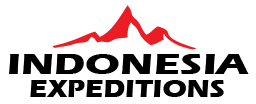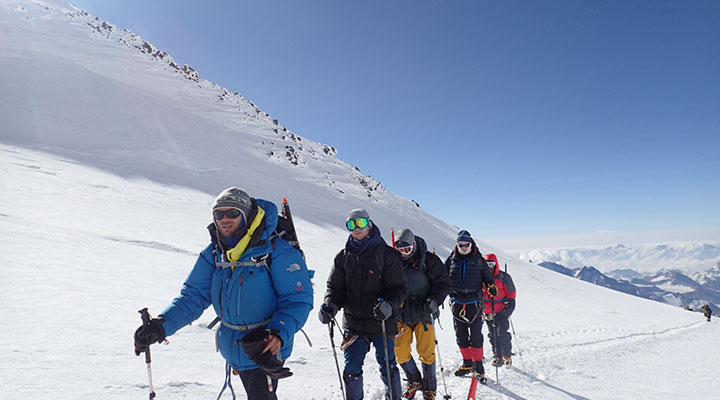MOUNT ELBRUS - 5,642 M
Mount Elbrus is part of Caucasus Mountain Range that stands on the border of two continental plates, Europe and Asia. It has two summits, which the West Summit (5,642m) is a little bit higher than the East Summit (5,621m). Elbrus is one of the Seven Summits representing Europe.
2023 Schedule
- May - June
OVERVIEW
Mount Elbrus is part of Caucasus Mountain Range that stands on the border of two continental plates, Europe and Asia. It has two summits, which the West Summit (5,642m) is a little bit higher than the East Summit (5,621m). Elbrus is one of the Seven Summits representing Europe. The central Caucasus Range have a high deposit of mineral, proven from the water that came from the mountains. The water sources have been cleverly utilized, not only for drink but also for healing. In Kislovodsk, there’s a sanatorium that use this mineral water for healing therapy. The water source called Narzan. Even the town we passed on the way to Elbrus is named Mineralnye Vody, which means mineral water. There are two ways to get to the summit of Mount Elbrus, one is from the north and the more popular one is from the south. Starting from Terskol village, there are more facilities in this area such as ski-lift that going up to 3,800m and snow-cat that can be used to cut some distance on summit day. Whilst there are none like this on the north route which make it more challenging.
ITINERARY
- DAY 1
- Fly to MoscowArrive in Moscow. We go to hotel for check-in and then we can have a short tour around Moscow
- DAY 2
- Moscow-Mineralnye Vody-TerskolToday we fly to Mineralnye Vody in the morning, for 2 hours. Then continue by private van to Terskol for 4 hours. After check-in at the hotel, we will check your gear for climbing. If not sufficient enough, you can rent the gear here at Terskol. Stay overnight.
- DAY 3
- Acclimatization to Cheget (3,000 m)In the morning, we go for acclimatization to Cheget. It is an easy 2-3 hours walk and go back to hotel for lunch and sort out the gear you need to rent, if any.
- DAY 4
- Terskol-Mountain Refuge (3,800 m)We go by private van to Azau station of Elbrus cable car and go up to the refuge at 3,800m where we will stay for the next 3-4 days climbing Elbrus. We leave our things in the refuge and go up again to 4,100m for acclimatization, where there are several other refuges. 1.5 hours walk. Here we spend a couple hours on snow training and go back down to the refuge.
- DAY 5
- Acclimatization to Pastukhov Rocks (4,750 m) Last acclimatization at Elbrus. We go again up the snow fields to Pastukhov Rocks. 5-6 hours walk. Back to the refuge.
- DAY 6
- Rest Day Today we rest at the refuge and prepare for summit day
- DAY 7
- Summit day It’s a long and hard day to ascend to Elbrus summit. First, we take snow cat to the top of Pastukhov Rocks. Hike up to the saddle (5,300m) between two summits. A traverse of 30-35 degrees slope leads to the summit plateau, and then it’s short small hike to the summit. It takes 10-14 hours round trip to the summit and back. We will take snow cat again from the top of Pastukhov Rocks to the refuge.
- DAY 8
- Back to Terskol/Reserve day After breakfast, we will go back to hotel in Terskol for a hot shower and celebration at dinner. This day also apply as a reserve day.
- DAY 9
- Terskol-Mineralnye Vody-Moscow Transfer to Mineralnye Vody. Then take a flight back to Moscow. If we have plenty of time at Moscow today, we can do a city tour.
- DAY 10 - 11
- Fly back home Fly back home. End of trip
INCLUDE
- Visa Invitation
- Russian Visa
- Domestic flight Moscow-Mineralnye Vody round trip
- Airport transfer Moscow
- Transportation Mineralnye Vody-Terskol round trip
- 2 nights hotel (twin share) in Moscow
- Full accommodation in Terskol
- Special registration visa in Elbrus area
- Climbing permit
- Cable car ticket
- Mountain Refuge
- Meals at Moscow
- All meals in Elbrus area
- Indonesia Expeditions Guide and Russian Guide
- Snow-cat for summit day
- Group climbing equipment (ropes, picket, etc)
EXCLUDE
- International flight to Moscow round trip
- Moscow city tour
- Personal climbing equipment
- Personal natural expenses (telephone, laundry, etc)
- Personal travel insurance
- Gratuities
PREPARATION
Glacier travel skills needed to climb Mount Elbrus. Though it’s not a main issue. You can train to walk on crampons prior to expedition if possible. Or else, there’s enough time to train there as well other skills training on the glacier. Altitude can be the main issue because the rate of ascend will be quite fast. Summit day will be long and demanding also. Training should focus on cardiovascular capability. you can do running two to three times a week for 45 minutes to an hour per session. Running on a route that have elevation gain will be a lot better, or use treadmill if there’s no such terrain in your hometown. You can change one of your running sessions in a week with cycling or swimming and especially you need to do also stair climbing with at least 10kg pack. It will be a good cross training. Besides that, muscle training is advisable. Strengthen your upper and lower body muscle, as well core muscle. You can do it at the gym or do your own set of push-ups, sit-ups, pull-ups, plank, etc. In addition, go weekend hiking regularly. It can be started with 8 km round trip hike with roughly 6kg pack, ascending and descending 600m, in less than 2.5 hours. The aim is to ascend 900m carrying an average pack of 10 kg in 3 hours. To reach it, try to increase the difficulty of your training in some way, either by adding weight to your pack (no more than 10 percent per week) or by completing the hike in a shorter amount of time. The capability to acclimatized are different for each person. So, building up your fitness even more will not be a waste. Just make sure you don’t injure yourself by overtraining and always have enough rest. Train 6 month before will increase the rate of success. But if you don’t have that much time, train at least 3 months before.
GEAR LIST
| No | Name | Amt |
|---|---|---|
| 1 | Trekking Boots | 1 pair |
| 2 | Double Boots | 1 pair |
| 3 | Crampons | 1 pair |
| 4 | Gaiters | 1 pair |
| 5 | Trekking Pole | 1 pair |
| 6 | Ice Axe | 1 |
| 7 | Climbing Harness | 1 |
| 8 | 1.5 meters of 7mm prusik/accessory cord | 2 |
| 9 | Locking carabiners | 3 |
| 10 | Booties (optional) | 1 pair |
| 11 | Wool or Synthetic socks | 3 pair |
| 12 | Liner socks | 2 pair |
| 13 | Midweight Baselayer Top (amount based on preferences) | 3 |
| 14 | Midweight Baselayer Bottom (amount based on preferences) | 2 |
| 15 | Trekking/Soft Shell pants | 2 |
| 16 | Soft Shell Jacket/puffy | 1 |
| 17 | Hard Shell Jacket w/ hood | 1 |
| 18 | Hard Shell pants | 1 |
| 19 | Insulated jacket/down jacket | 1 |
| 20 | Insulated synthetic pants | 1 |
| 21 | Baseball cap | 1 |
| 22 | Beanie | 1 |
| 23 | Buff (amount based on preferences) | 2 |
| 24 | Glacier glasses | 1 |
| 25 | Ski Goggles | 1 |
| 26 | Lightweight synthetic liner gloves | 1 pair |
| 27 | Mediumweight gloves/Ski Gloves | 1 pair |
| 28 | Insulated Mittens | 1 pair |
| 29 | 30L Backpack | 1 |
| 30 | Sleeping bag at least -20°C | 1 |
| 31 | Self-Inflating pad (optional) | 1 pair |
| 32 | Headlamp with spare batteries | 1 |
| 33 | Sunscreen, SPF 40 or better | 1 |
| 34 | Lip screen, SPF 30 | 1 |
| 35 | 1 Litre water bottle or water bladder | 2 |
| 36 | 1 Litre thermos | 1 |
| 37 | Pee Bottle (optional) | 1 |
| 38 | Toiletry bag | 1 |
| 39 | Large Duffel Bag | 1 |
| 40 | First aid kit and special medications (if any) | 1 |
| 41 | Camera | 1 |





